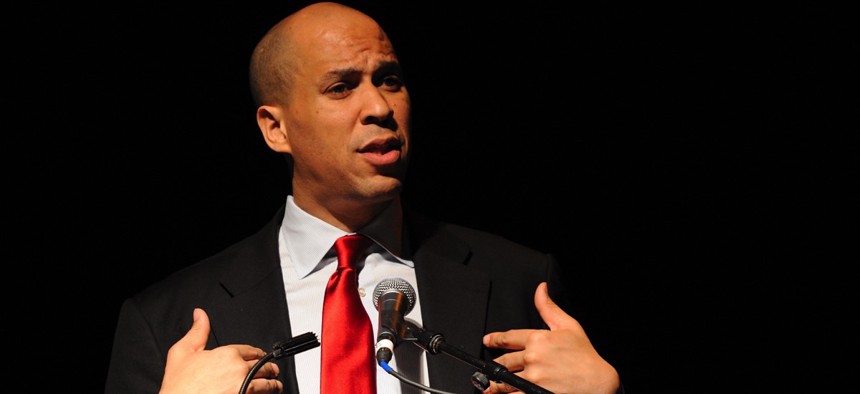Ending Unlimited Solitary Confinement in California; Booker to the Rescue for New Jersey’s Tunnel Mess?

U.S. Sen. Cory Booker Eugene Parciasepe / Shutterstock.com
Also: The Texas Supreme Court weighs education funding suit and suing Kansas for voting-machine tapes.
Here’s some of what we’ve been reading today …
SACRAMENTO, California: The Golden State will end a policy followed for the last 35 years that saw thousands of inmates held for unlimited time in solitary confinement, reports USA Today. The practice affected mostly suspected gang leaders, who were often kept for decades in soundproofed, windowless cells. The move was spurred by the Center for Constitutional Rights, a New York City-based nonprofit, which filed a class-action lawsuit recently settled on behalf of nearly 3,000 California inmates. The segregation system was adopted after a series of slayings of inmates and guards, according to sources who talked to the paper. Jeffrey Beard, secretary of the California Department of Corrections, said the segregation policy wasn't reconsidered until recently because corrections officials were consumed with other crises, including severe crowding. [USA Today]
NEWARK, New Jersey: Maybe U.S. Sen. Cory Booker can bring about a miracle, or the political equivalent, and win progress on long-stalled efforts to replace the 105-year-old Amtrak train tunnel connecting New York City with New Jersey under the Hudson River—the tunnel that’s causing repeat delays for commuters now and “projected to fail” in the next 20 years. The Record reports how Booker has been “acting as a go-between” and trying to bring together U.S. Transportation Secretary Anthony Foxx and New Jersey Gov. Chris Christie. The two men want to solve the tunnel problem but, as the Record reports, the “Republican-controlled House and Senate can’t agree on how to pay for routine highways and mass transit, let alone a massive public works project that links two blue states.”
The paper suggests that, if anyone can move the needle on the tunnel, it’s probably Booker:
Booker, the former mayor of Newark, has personal relationships with Christie and with Foxx, the former mayor of Charlotte, N.C. Booker is also the top Democrat on the surface transportation subcommittee and co-sponsor of a passenger rail bill that won bipartisan support in the full Commerce, Science and Transportation Committee last month. Booker said he knows the Obama administration “has been committed to and working on this for some time.” And Christie, he said, “wants to see the problems of NJ Transit dealt with. He’s committed to that.
Booker has co-sponsored a passenger rail bill that would increase revenue for capital improvements, including providing access to a $35 billion freight-train loan fund. That money, the Record reports, could be used to fund Amtrak’s proposed Gateway project, which would see a new two-track tunnel dug under the Hudson and the aging Portal Bridge over the Hackensack River replaced. The bill will likely pass the Senate this week and then run into a brick wall in the House. Nevertheless, Booker is cheered by the bipartisan support the bill drew in the Senate and is rallying for the larger cause on Capitol Hill—and his popular Twitter account. [The Record]
The Hudson rail tunnels are 105 yrs old. The economies of NY & NJ require we fix them. http://t.co/QbK6dV4TZw pic.twitter.com/QxWMOkpxqM
— Cory Booker (@CoryBooker) September 2, 2015
AUSTIN, Texas: Lawyers are arguing before the state Supreme Court this week over education funding. The school system has won in lower courts, arguing that lawmakers violated their constitutional duty to provide adequate funding to the public schools when they slashed $5.4 billion from the system in 2011. Education reformers say money isn’t the problem and are pushing school-choice and other free-market approaches. An assistant attorney general argued that districts could deliver a sufficient education “without iPads or teacher aides or brand-new facilities.” But data compiled by The Texas Tribune shows the schools are struggling to recover from the 2011 cuts. Staffing is still low, class sizes are swelling and test scores are flat. [The Texas Tribune]
BISMARCK, North Dakota: Has the “community expert” education movement found a foothold? All signals suggest that outgoing Gov. Jack Dalrymple plans to sign a bill loosening the state’s public education system hiring standards so that so-called community experts can be hired to teach “non-core subject areas such as business and family and consumer science,” reports The Jamestown Sun. The proposal was spurred by a running lack of applicants for teacher positions. This year, nearly 90 faculty positions in the school system were open with no teachers applying to fill them. Non-teacher-trained community experts hired to fill them would be paid not more than a first-year teacher’s salary and would not be eligible for the teacher pension plan. They would also have to meet regularly with a school district mentor. [The Jamestown Sun]
WICHITA, Kansas: As states consider updating their voting systems, a lawsuit in Kansas pitting Wichita University mathematician Beth Clarkson against Secretary of State Kris Kobach may draw more attention. Clarkson took up a theory reported in 2012 by two other mathematicians, who looked at vote totals across 10 states and noted that computer-generated results from larger precincts included greater percentage totals for Republican candidates, not Democratic candidates—a finding that goes against conventional wisdom that Democrats perform better in more-populous urban areas.
As The Topeka Capital-Journal reports, in Kansas, touch-screen voting machines produce a tape. Clarkson wants to review tapes from the 2014 election. Kobach says the voting machine tapes aren’t subject to open records laws and that their disclosure is prohibited. Clarkson has sued for access. A clerk explained to the judge in the case that each voting machine roll from the 2014 election is 385 feet long and that the rolls are stored in 42 boxes, none of which are sorted by precinct or by voting district.
Clarkson this week talked to elections-system watchdog Brad Friedman about the case on KPFK public radio. [The Topeka Capital-Journal, KPFK]
John Tomasic is a journalist based in Boulder, Colorado.
NEXT STORY: Should this be the end for Flash in government?





